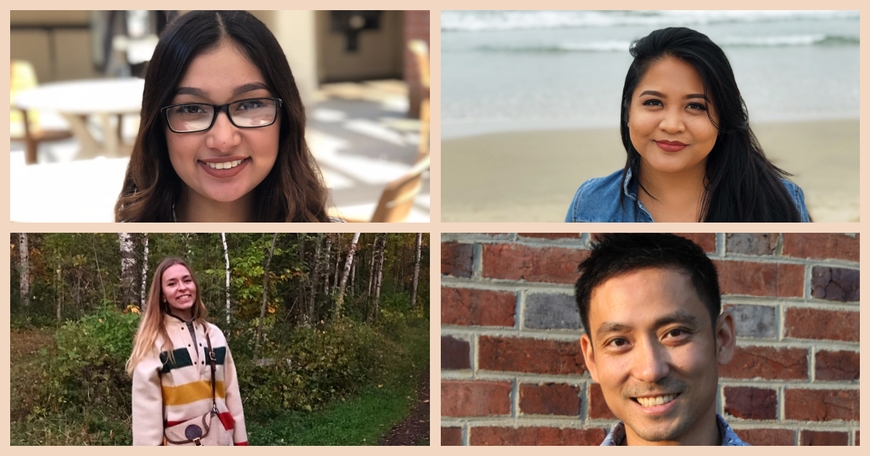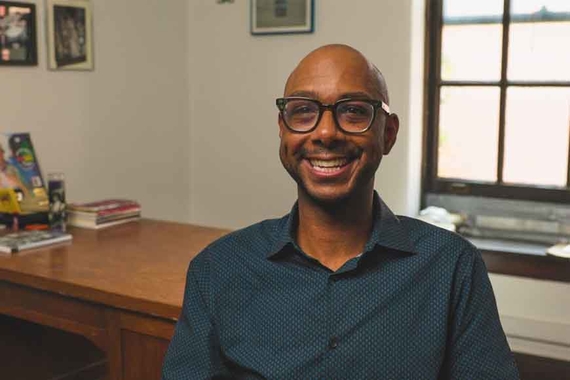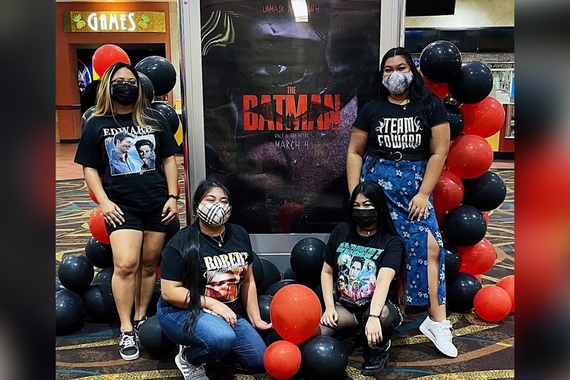American Studies 2018 Graduate Student Cohort
Please join us in welcoming our department's new cohort.
Kiara Padilla
Kiara Padilla (upper left corner) was an undergraduate student at California State University Northridge. She is a double major in psychology and Chicana/o studies. As an undergrad, Kiara focused on how accessing parole is almost unattainable for Latinx migrant lifers due to the lack of migrant traumas addressed in psychological evaluations used by the Board of Parole in California. In graduate school, Kiara plans to examine the mental health issues of Latinx migrant lifers that are being deported from prison and must reintegrate to Mexican society at US/Mexico border cities. By addressing incarceration, identity issues, institutional policy, and migrant traumas, Kiara looks forward to improving transnational public policy as it relates to this vulnerable population.
In her spare time, she likes to go to the movies, spend time with friends and family, and watch DIY gelatin flower videos. Kiara grew up in North Hollywood, California and identifies as Chicana/Latina. Her preferred pronouns are: she/her/hers.
Demiliza Saramosing
Demiliza Saramosing (upper right corner) is Bisayan (American) and was raised on the island of O‘ahu in the ahupua‘a and urban, majority working-class and immigrant city of Kalihi. She is also a first-generation college student holding BA degrees in ethnic studies and journalism from the University of Oregon and is currently completing her MA degree in Asian American studies from UCLA.
As a Filipina settler raised on US illegally occupied Native Hawaiian land, she believes her settler responsibility as a scholar is to bridge settler of color and Native epistemologies of and resistance movements on Hawaiian lands to achieve a collective consciousness for liberation. She has initiated this work through her current ethnographic MA thesis project on the Kalihi Valley Instructional Bike Exchange (KVIBE), a mentorship program in Kalihi that empowers boys of color of Filipino and Chuukese descent through the building and riding of bicycles. She is studying how the program mobilizes Nakem (Soul Consciousness) pedagogy, an Ilokano framework centered on the use of storytelling, to assist connecting these boys of color to their own histories, to each other, and to the urban and natural structures and landscapes in Kalihi. She is looking forward to expanding on this work for her PhD project.
In her free time, she loves exploring local coffee shops as well as talking story and being silly with friends. Her preferred pronouns are: she/her/hers.
Jonelle Walker
Jonelle Walker (lower left corner) completed her undergraduate degree in American Studies at the University of Minnesota - Twin Cities. Her undergraduate research is constructed around the question of what matters to the land, looking at decolonial praxis as an interactive and living place where every waawaashkeshi (deer), giizhik (cedar), wazhashk (muskrat), makwa (bear), and aandeg (crow) exist as living resistance. The research that is conducted for this project will be dependent on seasons and land interaction based on those seasons, privileging Indigenous knowledges, epistemologies, and ontologies in hopes of understanding decolonial sustainability and accessibility of decolonial spaces to the Twin Cities Urban Indian community.
As a graduate student, her research will pertain to the public and state parks where her ancestors are/were originally buried and how the relocation of living and dead play into the formation and practice of Indigenous tradition, identity, gender, spirituality, and language. How much of Indigenous identity is rooted in place? What would decolonization of these parks mean for their identities? What is at stake to reclaim? She asks these questions as a queer and mixed member of the Ojibwe diaspora, residing in Dakota nation.
Throughout her work she plans to utilize poetry, privilege elder knowledges, and various Ojibwe ways of knowing as a means to restate their validity and place in what is currently a colonial academia, making Indigenous scholarly identity accessible. With her poetry, she hopes to offer an insight into her positionality, both body and ideological, while showing how her personal is always political. Preferred pronouns are: she/her/hers & they/them/theirs.
Khoi Nguyen
Khoi Nguyen (lower right corner) received an MA in women’s studies focusing on queer Asian American literature at Southern Connecticut State University, and a BA in English at Fairfield University. Khoi previously taught in Asian American studies at the College of Ethnic Studies, San Francisco State University. Khoi's research will trace the genealogy of the queer refugee in the US post-1975 to have a better understanding of the state forms of border surveillance.
Their hobbies include, but not limited to, eating good local food and exploring the city. They lived in San Francisco, via Connecticut, and currently, reside in Trumplandia (aka DC). They identify as queer and fluctuate between he/him/his and they/them/their pronouns.



